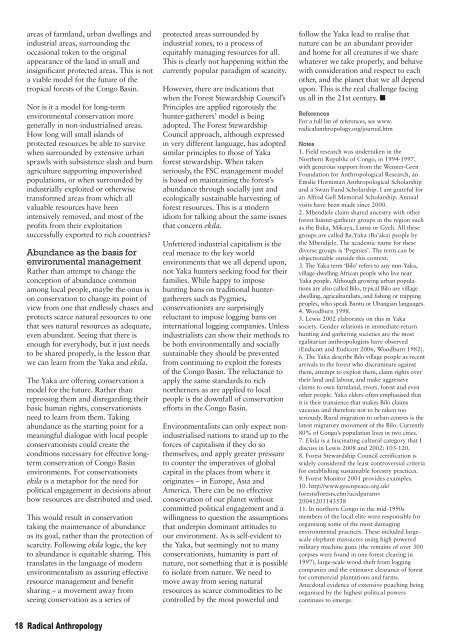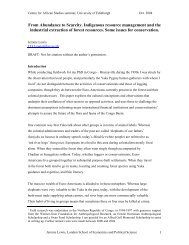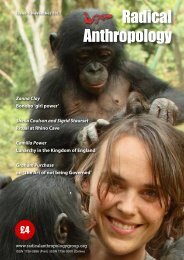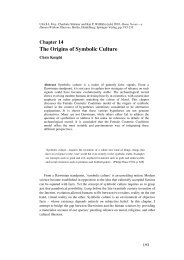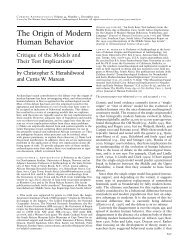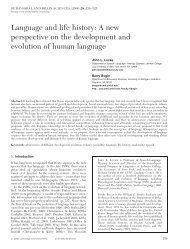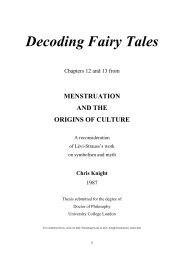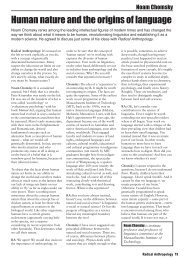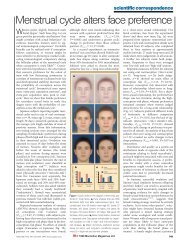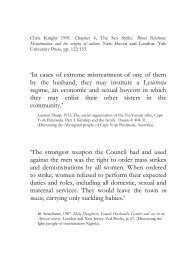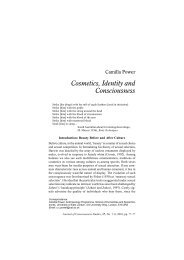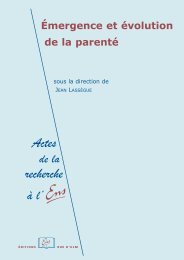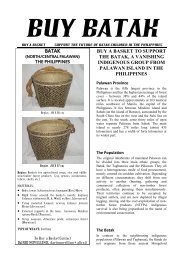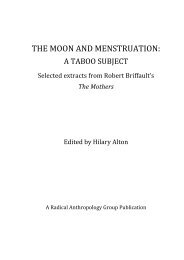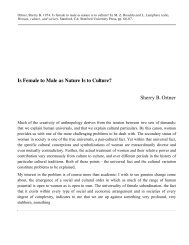The scarcity myth The scarcity myth - Radical Anthropology Group
The scarcity myth The scarcity myth - Radical Anthropology Group
The scarcity myth The scarcity myth - Radical Anthropology Group
Create successful ePaper yourself
Turn your PDF publications into a flip-book with our unique Google optimized e-Paper software.
areas of farmland, urban dwellings and<br />
industrial areas, surrounding the<br />
occasional token to the original<br />
appearance of the land in small and<br />
insignificant protected areas. This is not<br />
a viable model for the future of the<br />
tropical forests of the Congo Basin.<br />
Nor is it a model for long-term<br />
environmental conservation more<br />
generally in non-industrialised areas.<br />
How long will small islands of<br />
protected resources be able to survive<br />
when surrounded by extensive urban<br />
sprawls with subsistence slash and burn<br />
agriculture supporting impoverished<br />
populations, or when surrounded by<br />
industrially exploited or otherwise<br />
transformed areas from which all<br />
valuable resources have been<br />
intensively removed, and most of the<br />
profits from their exploitation<br />
successfully exported to rich countries<br />
Abundance as the basis for<br />
environmental management<br />
Rather than attempt to change the<br />
conception of abundance common<br />
among local people, maybe the onus is<br />
on conservation to change its point of<br />
view from one that endlessly chases and<br />
protects scarce natural resources to one<br />
that sees natural resources as adequate,<br />
even abundant. Seeing that there is<br />
enough for everybody, but it just needs<br />
to be shared properly, is the lesson that<br />
we can learn from the Yaka and ekila.<br />
<strong>The</strong> Yaka are offering conservation a<br />
model for the future. Rather than<br />
repressing them and disregarding their<br />
basic human rights, conservationists<br />
need to learn from them. Taking<br />
abundance as the starting point for a<br />
meaningful dialogue with local people<br />
conservationists could create the<br />
conditions necessary for effective longterm<br />
conservation of Congo Basin<br />
environments. For conservationists<br />
ekila is a metaphor for the need for<br />
political engagement in decisions about<br />
how resources are distributed and used.<br />
This would result in conservation<br />
taking the maintenance of abundance<br />
as its goal, rather than the protection of<br />
<strong>scarcity</strong>. Following ekila logic, the key<br />
to abundance is equitable sharing. This<br />
translates in the language of modern<br />
environmentalism as assuring effective<br />
resource management and benefit<br />
sharing – a movement away from<br />
seeing conservation as a series of<br />
protected areas surrounded by<br />
industrial zones, to a process of<br />
equitably managing resources for all.<br />
This is clearly not happening within the<br />
currently popular paradigm of <strong>scarcity</strong>.<br />
However, there are indications that<br />
when the Forest Stewardship Council’s<br />
Principles are applied rigorously the<br />
hunter-gatherers’ model is being<br />
adopted. <strong>The</strong> Forest Stewardship<br />
Council approach, although expressed<br />
in very different language, has adopted<br />
similar principles to those of Yaka<br />
forest stewardship. When taken<br />
seriously, the FSC management model<br />
is based on maintaining the forest’s<br />
abundance through socially just and<br />
ecologically sustainable harvesting of<br />
forest resources. This is a modern<br />
idiom for talking about the same issues<br />
that concern ekila.<br />
Unfettered industrial capitalism is the<br />
real menace to the key world<br />
environments that we all depend upon,<br />
not Yaka hunters seeking food for their<br />
families. While happy to impose<br />
hunting bans on traditional huntergatherers<br />
such as Pygmies,<br />
conservationists are surprisingly<br />
reluctant to impose logging bans on<br />
international logging companies. Unless<br />
industrialists can show their methods to<br />
be both environmentally and socially<br />
sustainable they should be prevented<br />
from continuing to exploit the forests<br />
of the Congo Basin. <strong>The</strong> reluctance to<br />
apply the same standards to rich<br />
northerners as are applied to local<br />
people is the downfall of conservation<br />
efforts in the Congo Basin.<br />
Environmentalists can only expect nonindustrialised<br />
nations to stand up to the<br />
forces of capitalism if they do so<br />
themselves, and apply greater pressure<br />
to counter the imperatives of global<br />
capital in the places from where it<br />
originates – in Europe, Asia and<br />
America. <strong>The</strong>re can be no effective<br />
conservation of our planet without<br />
committed political engagement and a<br />
willingness to question the assumptions<br />
that underpin dominant attitudes to<br />
our environment. As is self-evident to<br />
the Yaka, but seemingly not to many<br />
conservationists, humanity is part of<br />
nature, not something that it is possible<br />
to isolate from nature. We need to<br />
move away from seeing natural<br />
resources as scarce commodities to be<br />
controlled by the most powerful and<br />
follow the Yaka lead to realise that<br />
nature can be an abundant provider<br />
and home for all creatures if we share<br />
whatever we take properly, and behave<br />
with consideration and respect to each<br />
other, and the planet that we all depend<br />
upon. This is the real challenge facing<br />
us all in the 21st century. ■<br />
References<br />
For a full list of references, see www.<br />
radicalanthropology.org/journal.htm<br />
Notes<br />
1. Field research was undertaken in the<br />
Northern Republic of Congo, in 1994-1997,<br />
with generous support from the Wenner-Gren<br />
Foundation for Anthropological Research, an<br />
Emslie Horniman Anthropological Scholarship<br />
and a Swan Fund Scholarship. I am grateful for<br />
an Alfred Gell Memorial Scholarship. Annual<br />
visits have been made since 2000.<br />
2. Mbendjele claim shared ancestry with other<br />
forest hunter-gatherer groups in the region such<br />
as the Baka, Mikaya, Luma or Gyeli. All these<br />
groups are called Ba.Yaka (Ba’aka) people by<br />
the Mbendjele. <strong>The</strong> academic name for these<br />
diverse groups is ‘Pygmies’. <strong>The</strong> term can be<br />
objectionable outside this context.<br />
3. <strong>The</strong> Yaka term ‘Bilo’ refers to any non-Yaka,<br />
village-dwelling African people who live near<br />
Yaka people. Although growing urban populations<br />
are also called Bilo, typical Bilo are village<br />
dwelling, agriculturalists, and fishing or trapping<br />
peoples, who speak Bantu or Ubangian languages.<br />
4. Woodburn 1998.<br />
5. Lewis 2002 elaborates on this in Yaka<br />
society. Gender relations in immediate-return<br />
hunting and gathering societies are the most<br />
egalitarian anthropologists have observed<br />
(Endicott and Endicott 2006, Woodburn 1982).<br />
6. <strong>The</strong> Yaka describe Bilo village people as recent<br />
arrivals to the forest who discriminate against<br />
them, attempt to exploit them, claim rights over<br />
their land and labour, and make aggressive<br />
claims to own farmland, rivers, forest and even<br />
other people. Yaka elders often emphasised that<br />
it is their transience that makes Bilo claims<br />
vacuous and therefore not to be taken too<br />
seriously. Rural migration to urban centres is the<br />
latest migratory movement of the Bilo. Currently<br />
80% of Congo’s population lives in two cities.<br />
7. Ekila is a fascinating cultural category that I<br />
discuss in Lewis 2008 and 2002: 103-120.<br />
8. Forest Stewardship Council certification is<br />
widely considered the least controversial criteria<br />
for establishing sustainable forestry practices.<br />
9. Forest Monitor 2001 provides examples.<br />
10. http://www.greenpeace.org.uk/<br />
forests/forests.cfmucidparam=<br />
20041201143538<br />
11. In northern Congo in the mid-1990s<br />
members of the local elite were responsible for<br />
organising some of the most damaging<br />
environmental practices. <strong>The</strong>se included largescale<br />
elephant massacres using high powered<br />
military machine guns (the remains of over 300<br />
corpses were found in one forest clearing in<br />
1997), large-scale wood theft from logging<br />
companies and the extensive clearance of forest<br />
for commercial plantations and farms.<br />
Anecdotal evidence of extensive poaching being<br />
organised by the highest political powers<br />
continues to emerge.<br />
18 <strong>Radical</strong> <strong>Anthropology</strong>


